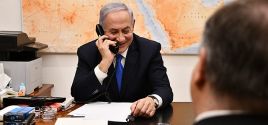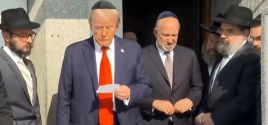Israel strikes new Gaza targetsBBCJun. 30, 2006 |
Popular 
Chris Rufo Discovers Who is Flooding The Small Town of Charleroi, Pennsylvania With Haitian Migrants

Israel Jails American Journalist for Reporting on Damage from Iran's Strikes [UPDATE]

WATCH: New Film 'Atrocity Inc' Exposes How Israel Lied About October 7th to Justify Genocide

Netanyahu: Trump Called to 'Congratulate' Me On War With Hezbollah

Trump Visits Lubavitcher Rebbe's Grave With Ben Shapiro for October 7th
 Israeli aircraft have launched a fresh wave of air strikes on Gaza, intensifying pressure on Palestinian militants to free a captured soldier. The Palestinian interior ministry was hit, while a militant was reported killed in an air strike - the first fatality since the offensive began. Meanwhile the UN has warned of an imminent humanitarian crisis in Gaza. On Thursday Israel said it was postponing sending troops into northern Gaza to give diplomacy a chance. In an interview with the Egyptian newspaper al-Ahram, Egyptian President Hosni Mubarak said the Palestinian militant group Hamas had agreed to the conditional release of Cpl Gilad Shalit, who was captured on Sunday. "Up to now, the Israeli side does not accept," Mr Mubarak is quoted as saying, without giving details of the Palestinian conditions. But there has been no public Israeli response. The Israeli government has demanded Cpl Shalit's unconditional release, and our Jerusalem correspondent Nick Thorpe says the Israeli government seems unlikely to greet Mr Mubarak's comments with great enthusiasm. Egyptian officials have been trying to negotiate Cpl Shalit's release since the beginning of the crisis. 'All-out war' In the latest round of air strikes, Israeli warplanes fired missiles into the unoccupied Palestinian interior ministry in Gaza City shortly after midnight on Friday, setting the building ablaze. A member of the militant Islamic Jihad group was killed in a missile strike in Rafah in southern Gaza, Palestinian medical sources said. At least 20 other targets included an office of Palestinian Authority President Mahmoud Abbas' Fatah group, militant training camps, a weapons storage facility in Gaza City and sites used by militants to fire rockets at Israel. Saeb Erekat, an aide to Mr Abbas, accused Israel of trying to bring down the Palestinian presidency and government. "Israel is now waging an open-ended all-out war against the Palestinian people that aims to topple the Palestinian presidency and the Palestinian government, and act as though there is no Palestinian official or government," he told the BBC. There were also reports of heavy exchanges of fire between militants and an undercover Israeli force near the northern town of Jabaliya. The Israelis have denied that there are any of its troops in northern Gaza, but in reality they would be unlikely to confirm the presence of an undercover unit, says the BBC's Alan Johnston in Gaza. Israel is continuing to hold dozens of officials from the ruling Hamas party, including at least eight cabinet members and at least 20 MPs detained on Thursday. Humanitarian fears Meanwhile, the UN's emergency relief co-ordinator Jan Egeland said that Gaza was on the brink of a humanitarian crisis after the destruction by the Israeli air force of the only power plant there on Tuesday night. "No-one can hide from us what they're doing, neither the Palestinian nor the Israeli side," Mr Egeland said. "We are appalled by seeing how they're playing with the future of defenceless civilians, including children." Much of Gaza's water supply and the sewerage system is dependent on electricity. Some of the wells can be operated by generators, but fuel is scarce after Israel stopped supplies. "I'm confident that the parties will see that we're heading for the abyss unless we get electricity and fuel restored," Mr Egeland said. Nervous civilians have been stockpiling batteries and candles, as well as food and water. |



